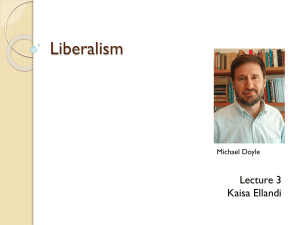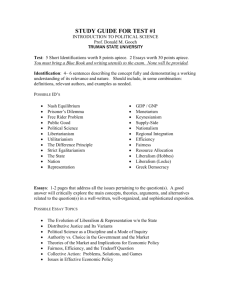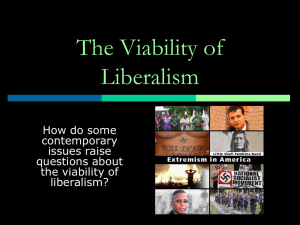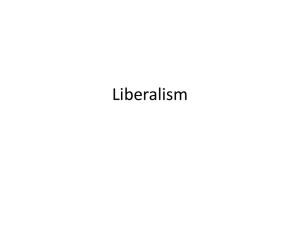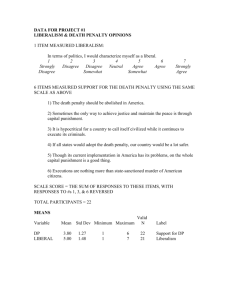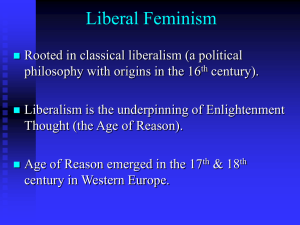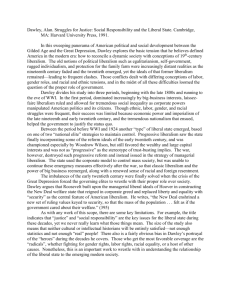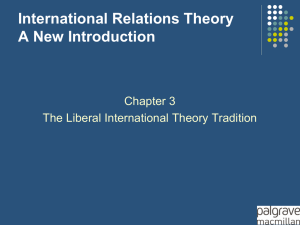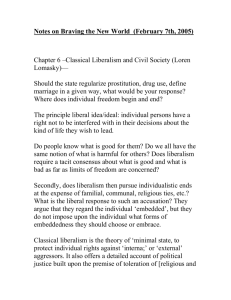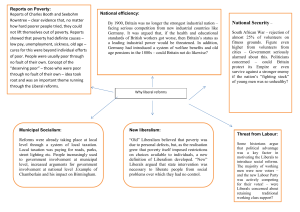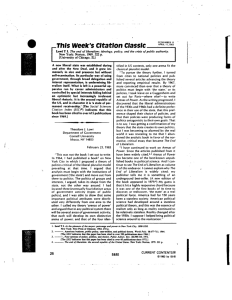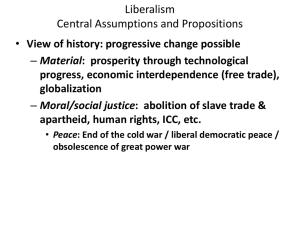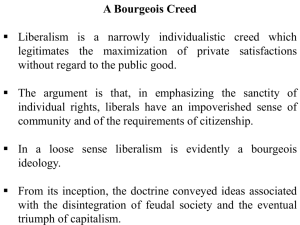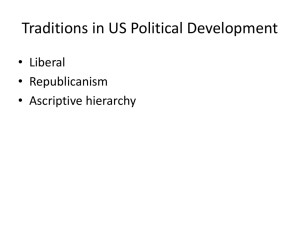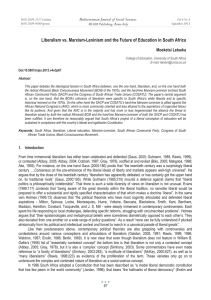Chapter 6 Summary
advertisement
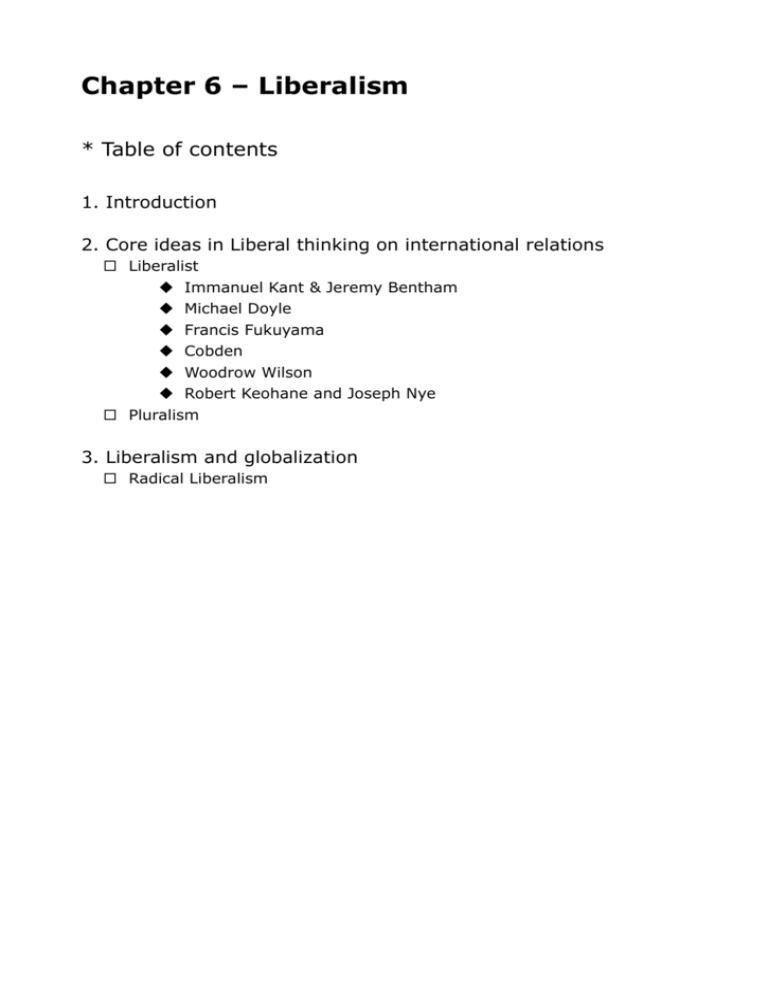
Chapter 6 – Liberalism * Table of contents 1. Introduction 2. Core ideas in Liberal thinking on international relations Liberalist Immanuel Kant & Jeremy Bentham Michael Doyle Francis Fukuyama Cobden Woodrow Wilson Robert Keohane and Joseph Nye Pluralism 3. Liberalism and globalization Radical Liberalism 1. Introduction Liberals argue that power politics itself is the product of ideas, and crucially, ideas can change. The belief in the possibility of progress is one identifier of a liberal approach to politics. Liberalism with a four-dimensional definition → Juridical equality, democracy, liberty, and the free market. Liberals have agreed with Realists that war is a recurring feature of the anarchic states system. But unlike realists, they do not identify anarchy but imperialism, the balance of power, and undemocratic regimes as the cause of war. (refer to Box 6.1 on p.111) An important cleavage within Liberalism is between those operating with a positive conception of Liberalism, who advocate interventionist foreign policies and stronger international institutions, and those who incline towards a negative conception, which places a priority on toleration and non-intervention. The First World War shifted liberal thinking towards a recognition that peace is not a natural condition but is one which must be constructed. 2. Core ideas in Liberal thinking on international relations Liberalist Immanuel Kant & Jeremy Bentham They elaborate plans for ‘perpetual peace’. →Immanuel Kant The imperative to achieve perpetual peace required the transformation of individual consciousness, republican constitutionalism, and a federal contract between states to abolish war. This federation can be likened to a permanent peace treaty, rather than a ‘superstate’ actor or world government. →Jeremy Bentham The power of law is able to solve the problem of war (A legal and institutional frame work must be established). Michael Doyle Liberal states have created a ‘separate peace’. There are two elements to the Kantian legacy: restraint among liberal states and ‘international imprudence’ in relations with non-liberal states (the democratic peace). Liberal states tend to be in relations of amity with other liberal states. Francis Fukuyama Liberal states were more stable internally and more peaceful in their international relations. Cobden Free trade would create a more peaceful world order is a core idea of nineteenth-century Liberalism. Trade brings mutual gains to all the players. → Key criticism: the supposed universal value of free trade brought disproportionate gains to the hegemonic power. Woodrow Wilson Peace could only be secured with the creation of an international organization to regulate the international anarchy. Just as peace had to be enforced in domestic society, the international domain had to have a system of regulation for coping with disputes and an international force which could be mobilized if non-violent conflict resolution failed. In this sense, more than any other strand of Liberalism, Idealism rests on the domestic analogy. For idealists, the freedom of states is part of the problem of international relations. According to them, states must be part of an international organization, and be bound by its rules and norms. This was the idea behind the collective security system1. Robert Keohane and Joseph Nye The centrality of other actors, such as interest groups, transnational corporations, and international non-governmental organizations (INGOs), had to be taken into consideration. Robert Keohane An important distinction between cooperation and harmony. ‘Cooperation is not automatic, but requires planning and negotiation’. Pluralism The most important contribution of Pluralism was its elaboration of interdependence. Due to the expansion of capitalism and the emergence of a global culture, Pluralists recognized a growing interconnectedness in which ‘changes in one part of the system have direct and indirect consequences for the rest of the system’. Absolute state autonomy was being circumscribed by interdependence. It focused on new actors (transnational corporations, non-governmental organizations) and new patterns of interaction (interdependence, integration). 3. Liberalism and globalization The Liberalism of privilege According to this perspective, the problems of globalization need to be addressed by a combination of strong democratic states. → the success of the liberal hegemony of the post-1945 era. Once one set of institutional arrangements becomes embedded it is very difficult for alternatives to make inroads → The narrow historical ‘window’ that exists for new institutional design. → The durability of existing institutions. This is a manifesto for managing an international order in which the Western states who paid the start-up costs of the institutions are now experiencing significant returns on their institutional investment. At the other end of the spectrum, the current order is highly unresponsive to the needs of weaker states and peoples. Radical Liberalism The liberalization advocated by Western financial institutions, particularly in economically impoverished countries. Three examples illustrate this dilemma → The more the West becomes involved in the organization of developing states’ political and economic infrastructure, the less those states are able to be accountable to their domestic constituencies. → In order to qualify for Western aid and loans, states are often required to meet harsh economic criteria requiring cuts in many welfare programmes. → The inflexible response of international financial institutions to various crises in the world-economy has contributed to a backlash against Liberalism per se. There is a massive democratic deficit at the global level. Issues of international peace and security are determined by only 15 members of international society. Of whom only five can exercise a power of veto. The power exerted by the West and its international financial institutions perpetuates structural inequality. Radical liberals place great importance on the civilizing capacity of global society. It is vital that citizens’ networks are broadened and deepened to monitor and cajole these institutions. the collective security An arrangement where ‘each state in the system accepts that the security of one is the concern of all, and agrees to join in a collective response to aggression’ 1

